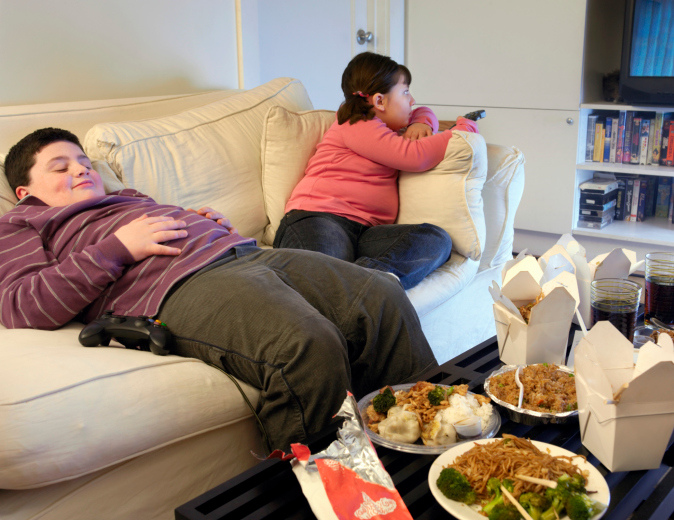The CDiabetes News Brief: October 13 to 19, 2014
Compiled and edited by Elizabeth Klein, MPhil
Family meals may keep teens at a healthy weight
 Obesity is on the rise in children and teenagers, and researchers aren’t always sure why. However, recent research published in the Journal of Pediatrics has shown that eating family meals at home tends to help teens avoid becoming overweight or obese. Surprisingly, this effect tends to work even into adulthood. The scientists behind the study think that part of the reason family meals are so healthy is that they tend to have plenty of fruits, vegetables, whole grains, and important nutrients like calcium. Teens may not have regular access to these healthy foods if they aren’t being cooked at home.
Obesity is on the rise in children and teenagers, and researchers aren’t always sure why. However, recent research published in the Journal of Pediatrics has shown that eating family meals at home tends to help teens avoid becoming overweight or obese. Surprisingly, this effect tends to work even into adulthood. The scientists behind the study think that part of the reason family meals are so healthy is that they tend to have plenty of fruits, vegetables, whole grains, and important nutrients like calcium. Teens may not have regular access to these healthy foods if they aren’t being cooked at home.
Read More . . .
Type 2 diabetes remission is rare without weight loss surgery
 Scientists and healthcare providers are always looking for a cure for type 2 diabetes, but right now it is not possible for most. Recent research has found that, while some people are able rid themselves of diabetes symptoms and return to normal blood glucose levels (called “remission,”), this is very rare. Remission is more common among people with diabetes who have had weight loss surgery, but even surgery is no guarantee that your glucose levels will stay in the normal range over the long term.
Scientists and healthcare providers are always looking for a cure for type 2 diabetes, but right now it is not possible for most. Recent research has found that, while some people are able rid themselves of diabetes symptoms and return to normal blood glucose levels (called “remission,”), this is very rare. Remission is more common among people with diabetes who have had weight loss surgery, but even surgery is no guarantee that your glucose levels will stay in the normal range over the long term.
Read More . . .
Video games could help kids learn healthy behaviors
 Almost half of all American children play video games every day. While this has some healthcare providers worried–people who play many hours of video games tend to get less exercise–an opinion piece published in Pediatrics suggests that games can be used for good. The authors point to games like Re-Mission, which have helped children with cancer understand their disease and learn how to take better care of themselves. They hope that, in the future, we can use video games to help children avoid or care for their diabetes more easily, in a way that is fun for them.
Almost half of all American children play video games every day. While this has some healthcare providers worried–people who play many hours of video games tend to get less exercise–an opinion piece published in Pediatrics suggests that games can be used for good. The authors point to games like Re-Mission, which have helped children with cancer understand their disease and learn how to take better care of themselves. They hope that, in the future, we can use video games to help children avoid or care for their diabetes more easily, in a way that is fun for them.
Read More . . .
Underweight people with diabetes face higher risk of death
 You probably know that being overweight or obese puts you at a higher risk for diabetes, heart disease, and certain cancers. It can also make it harder to manage your diabetes symptoms, like high blood glucose and high cholesterol levels. But did you know that being underweight (BMI of 18.5 or lower) is also connected with a higher risk of death in people with diabetes? Japanese researchers recently found that while people at healthy weights were less likely to die of diabetes complications, those who were underweight had almost as high a risk as those who were overweight. The findings were published in the Journal of Clinical Endocrinology & Metabolism.
You probably know that being overweight or obese puts you at a higher risk for diabetes, heart disease, and certain cancers. It can also make it harder to manage your diabetes symptoms, like high blood glucose and high cholesterol levels. But did you know that being underweight (BMI of 18.5 or lower) is also connected with a higher risk of death in people with diabetes? Japanese researchers recently found that while people at healthy weights were less likely to die of diabetes complications, those who were underweight had almost as high a risk as those who were overweight. The findings were published in the Journal of Clinical Endocrinology & Metabolism.
Read More . . .
Plastic surgery after big weight loss raises risk of complications
 People who lose a lot of weight at one time often choose to have body-contouring procedures, like liposuction, body lifts and tummy tucks, to help with the sagging skin that results. But findings from a recent study show that those who lose 100 pounds or more before having a body-contouring procedure have a higher risk of surgery complications. The risk is especially high for those who had weight loss surgery. The researchers think that this is because after surgery, people often eat fewer than 1,000 calories every day. This is not enough food to help them fight the stress of surgery, or enough nutrients to help them heal.
People who lose a lot of weight at one time often choose to have body-contouring procedures, like liposuction, body lifts and tummy tucks, to help with the sagging skin that results. But findings from a recent study show that those who lose 100 pounds or more before having a body-contouring procedure have a higher risk of surgery complications. The risk is especially high for those who had weight loss surgery. The researchers think that this is because after surgery, people often eat fewer than 1,000 calories every day. This is not enough food to help them fight the stress of surgery, or enough nutrients to help them heal.
Read More . . .
Better quality of life seen in people with diabetes on low-carb meal plans
 Over the course of two years, 61 people with diabetes were studied at Linkoping University in Sweden. Researchers were looking to see whether low-carb or low-fat meal plans were better for weight loss, blood glucose control, and helping people avoid heart disease. They found that while both types of plans helped the participants lose weight, only the low-carb group had healthy glucose control, less pain, and improved emotional and mental health. This means that low-carb plans might be effective at keeping people with diabetes happy, healthy and stress-free.
Over the course of two years, 61 people with diabetes were studied at Linkoping University in Sweden. Researchers were looking to see whether low-carb or low-fat meal plans were better for weight loss, blood glucose control, and helping people avoid heart disease. They found that while both types of plans helped the participants lose weight, only the low-carb group had healthy glucose control, less pain, and improved emotional and mental health. This means that low-carb plans might be effective at keeping people with diabetes happy, healthy and stress-free.
Read More . . .
Worse surgery outcomes seen in people who use insulin
 For people with diabetes, surgery can be risky. A recent study published in the journal Spine has shown that those who use insulin to control their diabetes are more likely to have complications after a kind of surgery called “c.” This is used to decrease joint pain in the spine. Researchers at Yale University looked at the records of over 15,000 surgery patients and found that those who used insulin were more likely to face serious problems, like sepsis, pneumonia, and death after surgery. Those who had diabetes but did not use insulin also had an increased risk, but it was not as high.
For people with diabetes, surgery can be risky. A recent study published in the journal Spine has shown that those who use insulin to control their diabetes are more likely to have complications after a kind of surgery called “c.” This is used to decrease joint pain in the spine. Researchers at Yale University looked at the records of over 15,000 surgery patients and found that those who used insulin were more likely to face serious problems, like sepsis, pneumonia, and death after surgery. Those who had diabetes but did not use insulin also had an increased risk, but it was not as high.
Read More . . .
Fried foods raise gestational diabetes risk
 Most people know that fried, oily foods can increase their risk for obesity, diabetes and heart disease. But a new study has shown that fried foods prepared outside the home (at restaurants or fast food chains, for example) may also raise gestational diabetes risk, which occurs during pregnancy. Those who reported eating fried food outside the home seven or more times each week had an 88% higher risk of this type of diabetes. However, fried foods cooked at home did not carry this risk. The researchers believe that this is because the vegetable oils used at restaurants tend to be more harmful than the fats people use to cook at home.
Most people know that fried, oily foods can increase their risk for obesity, diabetes and heart disease. But a new study has shown that fried foods prepared outside the home (at restaurants or fast food chains, for example) may also raise gestational diabetes risk, which occurs during pregnancy. Those who reported eating fried food outside the home seven or more times each week had an 88% higher risk of this type of diabetes. However, fried foods cooked at home did not carry this risk. The researchers believe that this is because the vegetable oils used at restaurants tend to be more harmful than the fats people use to cook at home.
Read More . . .
Obesity is connected to heart problems in children
 Though it is very rare for children to have heart disease, new research has shown that obese kids may show warning signs at very young ages. A recent study, which was published in the Journal of the American College of Cardiology, showed that obese children tend to have higher cholesterol, higher blood pressure, and larger heart valves than is healthy at their age. These are all risks for future heart problems. We do not yet know if weight loss will help their hearts return to normal, as more research is needed.
Though it is very rare for children to have heart disease, new research has shown that obese kids may show warning signs at very young ages. A recent study, which was published in the Journal of the American College of Cardiology, showed that obese children tend to have higher cholesterol, higher blood pressure, and larger heart valves than is healthy at their age. These are all risks for future heart problems. We do not yet know if weight loss will help their hearts return to normal, as more research is needed.
Read More . . .
Cure for type 1 diabetes may not be far away
 Type 1 diabetes is an autoimmune problem that causes the body to attack its own pancreatic cells, which means that people with this condition cannot control their insulin or blood glucose levels without medicine. New research from Harvard University has shown that it might be possible to make these pancreatic cells in labs. In the future, this process might be used to help people with type 1 diabetes produce their own insulin, and not have to rely on pumps or injections for most of their lives.
Type 1 diabetes is an autoimmune problem that causes the body to attack its own pancreatic cells, which means that people with this condition cannot control their insulin or blood glucose levels without medicine. New research from Harvard University has shown that it might be possible to make these pancreatic cells in labs. In the future, this process might be used to help people with type 1 diabetes produce their own insulin, and not have to rely on pumps or injections for most of their lives.
Read More . . .

